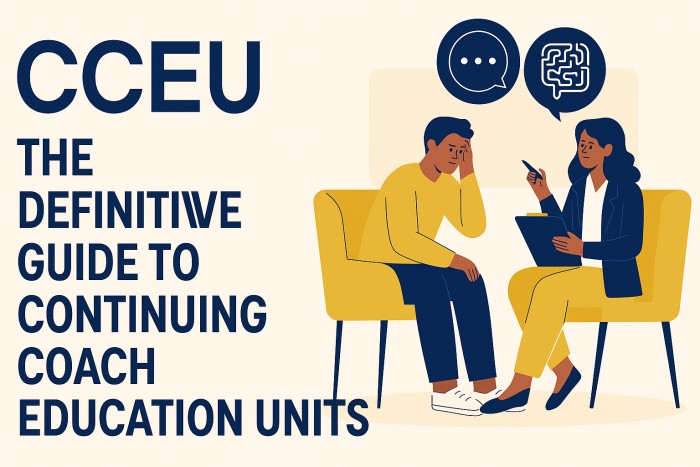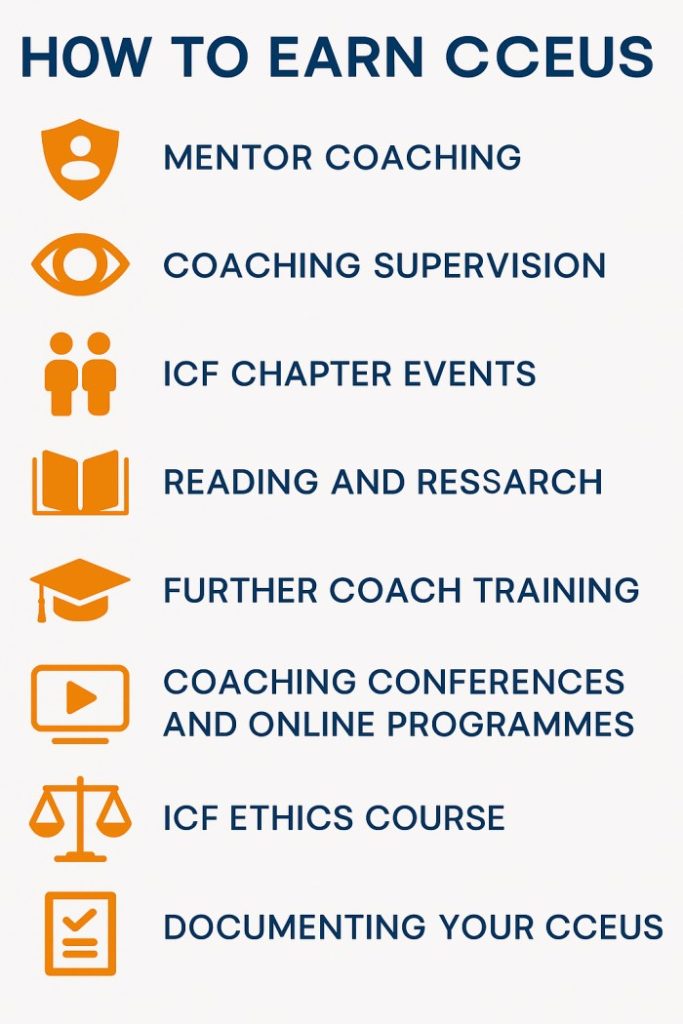
India’s economy has transformed dramatically over the last decade, and the demand for top business coach India services has grown...
Professional coaching is a rapidly growing field, and maintaining your credentials is crucial for demonstrating competence and ethical practice. Continuing Coach Education Units (CCEUs) are the lifeblood of credential renewal. In this definitive guide, you’ll learn what CCEUs are, why they matter for International Coaching Federation (ICF) credentials and how to earn them efficiently. Whether you’re an Associate Certified Coach (ACC), Professional Certified Coach (PCC) or Master Certified Coach (MCC), this article provides everything you need to plan your continuing education and stay ahead of the curve.

Continuing Coach Education Units (CCEUs) are the official measurement used by the International Coaching Federation to track post‑credential learning. One CCEU is roughly equivalent to one contact hour of coach‑specific education. When coaches renew their ACC, PCC or MCC credentials, they must document 40 hours of continuing education every three years. This requirement ensures coaches stay current with evolving best practices and ethical standards.
The ICF divides CCEUs into two major categories:
Understanding the difference between these categories is vital because the ICF requires at least 24 hours of core competency credits and up to 16 hours of resource development during each three‑year renewal cycle. When selecting programmes, verify the type and amount of credit you’ll receive to ensure you meet the distribution requirements.
Investing in continuing education pays dividends for both coaches and clients. According to Bailey Balfour’s introduction, failing to plan your CCEUs can make the 40‑hour requirement feel daunting. Spreading learning across three years not only makes renewal easier but also fosters continuous growth. Here’s why ongoing education is essential:
Coaching is an evolving discipline. New models and research emerge regularly, and continuing education keeps your skills sharp. Core competency training enhances your ability to create awareness, build trust and maintain ethical practice. Resource development credits expand your knowledge base in areas like leadership, neuroscience, positive psychology and business development.
The ICF’s renewal process serves as a quality assurance mechanism. By requiring 40 CCEUs every three years, the federation ensures that credentialed coaches remain competent and ethical. Without renewal, credentials lapse, which can reduce client trust and limit professional opportunities.
Ethics and professional conduct are pillars of coaching. Many programmes include ethics modules, and the ICF mandates at least 3 hours of coaching ethics during each renewal cycle. Regular ethics training helps coaches navigate dilemmas and uphold client confidentiality, boundaries and respect.
Clients seek coaches who invest in their own growth. Documented continuing education signals commitment to excellence. Coaches who stay abreast of evidence‑based practices can deliver more impactful sessions, leading to better client satisfaction and referrals.
CCEU programmes come in various formats, from online courses and live workshops to mentor coaching and self‑paced research. Choosing the right mix ensures you meet core‑competency and resource‑development requirements while aligning with your learning style.
Core competency credits focus on the skills and knowledge essential to coaching. The ICF’s eight core competencies include demonstrating ethical practice, embodying a coaching mindset, establishing agreements, cultivating trust and safety, maintaining presence, listening actively, evoking awareness and facilitating client growth. Examples of core competency CCEU activities include:
Activity | Typical Hours | Notes |
Accredited coach training | 10–30 hours | Completing a higher‑level programme (e.g., Level 2 training after Level 1) counts toward core competency hours. |
Mentor coaching | 10 hours | ACC credential holders must complete 10 hours of mentor coaching, including 3 hours of one‑on‑one mentoring. Mentoring improves coaching presence and feedback skills. |
Coaching supervision | Up to 10 hours | Regular supervision allows coaches to discuss client cases confidentially, develop reflective practice and deepen competence. |
Ethics courses | 3 hours | A mandatory component emphasising professional standards and confidentiality. |
Many training providers offer packages that bundle these elements. For example, CoachVille’s catalogue lists programmes such as the Play Life Coaching Method and Coaching Superpowers, each providing specific CCEU allocations.
Resource development credits encourage coaches to broaden their horizons beyond core coaching competencies. Some examples include:
When logging your CCEUs, keep a record of programme names, dates, providers and learning outcomes. The ICF provides a learning portal where you can upload evidence and track your hours.

Earning 40 CCEUs becomes manageable when you diversify your learning methods. Below is a step‑by‑step roadmap inspired by Bailey Balfour’s “Idea” framework.
Mentor coaching involves receiving feedback on your coaching sessions from a qualified coach (ACC with three years’ experience, PCC or MCC). The ICF requires ACC coaches to complete 10 hours of mentor coaching with at least 3 hours one‑on‑one. To maximise your learning:
Supervision provides a safe space to discuss client cases, personal reactions and ethical dilemmas. Unlike mentor coaching, supervision focuses on reflective practice rather than skill‑building. You can claim up to 10 hours of core competency CCEUs for supervision. Consider joining a group supervision programme to share learning with peers.
When you join the ICF, you automatically become part of your local chapter. Chapters organise webinars, workshops and networking events, many of which offer free or low‑cost CCEUs. Benefits of participating include:
Reading industry books, journals and research papers counts toward resource development credits. To make reading count:
Advancing your education is one of the most efficient ways to accumulate CCEUs. Enrolling in Level 2 or Level 3 courses after completing Level 1 not only elevates your credential but also provides substantial core competency credits. When selecting programmes:
Annual conferences and virtual summits offer rich learning and networking. The ICF Annual Conference and events hosted by Coaching.com are prime opportunities to earn resource development credits. When attending:
To renew any ICF credential, you must complete 3 hours of ethics training. The ICF offers an online ethics course via your Learning Portal. Steps to complete it:
Accurate documentation is key. The ICF Learning Portal allows you to upload training records and maintain a running tally of your hours. Best practices include:
Selecting quality programmes ensures you gain meaningful learning and meet accreditation requirements. Use the criteria below when evaluating options:
Criterion | Why it matters |
Accreditation | Ensure the provider is recognised by the ICF or another reputable body. Accredited programmes guarantee that hours will count toward your renewal. |
Content relevance | Choose topics aligned with your coaching niche and developmental goals (e.g., leadership, wellness, team coaching, diversity and inclusion). |
Delivery format | Decide between live workshops, virtual classes, self‑paced courses or blended models. Consider your schedule and learning preferences. |
Faculty expertise | Research instructors’ credentials and experience. High‑quality programmes often feature MCC‑level coaches or subject‑matter experts. |
Cost and value | Compare tuition fees relative to the number of CCEUs offered and additional benefits (e.g., peer network, mentoring, support materials). |
Support and community | Programmes that include mentoring, supervision or alumni networks can enhance learning beyond the classroom. |
Once you’ve selected programmes, plan your CCEU acquisition across the three‑year renewal cycle. Spread activities evenly to avoid last‑minute stress and to continually infuse your practice with fresh insights.
Continuing Coach Education Units are more than a bureaucratic hurdle; they’re an investment in yourself and your clients. By understanding the types of CCEUs, planning your learning strategically and leveraging diverse educational opportunities, you can maintain your ICF credential with ease and confidence. Start early, mix different learning modalities, and engage with the broader coaching community to enrich your practice.
No. CEUs (Continuing Education Units) are used in many professions (e.g., nursing, education) and often represent ten contact hours per unit. CCEUs are specific to coaching and typically equal one contact hour. Always ensure you’re earning CCEUs approved by the ICF.
All ICF credential holders—ACC, PCC and MCC—need 40 CCEUs every three years. At least 24 hours must be core competency, and up to 16 hours may be resource development.
Yes. Reading coaching books and research counts toward resource development credits. You must document the material, summarise your learning and ensure it enhances your coaching practice.
Use the ICF Education Search Service and search for “CCE programmes.” Many reputable organisations like CoachVille, CTEDU, Coaches Rising and Beabove Leadership offer accredited programmes.
No. CCEUs must be earned within each three‑year cycle. Hours earned beyond your 40‑hour requirement cannot be rolled over.

India’s economy has transformed dramatically over the last decade, and the demand for top business coach India services has grown...

When searching for a certified life coach program price, it’s natural to start by comparing tuition fees. Aspiring coaches want...

Neuro-Linguistic Programming (NLP) is experiencing a resurgence in India. Social media, workshops and high-energy seminars promise instant breakthroughs by rewiring...

Many professionals pursue the title of Certified Organizational Development Coach with the expectation that a credential alone will open corporate...

Some providers offer to fast-track you to PCC status through purely online modules for a fraction of the cost of...

Executive coaching has evolved from a niche service for struggling leaders into a strategic investment for organisations aiming to build...

When prospective coaches research training options, cost is often the first number they look for. A quick internet search produces...

Deciding to invest in life coach training programmes can be a transformative milestone in your personal and professional journey. In...

Choosing the right online life coaching courses can be one of the most transformative decisions you ever make.